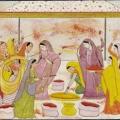17. Jessica Frazier on Hinduism and Philosophy
Posted on
An interview with Jessica Frazier about philosophical ideas and arguments in the Vedas, Upanisads and later Hindu texts.
Themes:
Further Reading
• J. Frazier, Reality, Religion and Passion: Indian and Western Approaches in Hans-Georg Gadamer and Rupa Gosvami (Lanham: 2008).
• J. Frazier, "Natural Theology in Asian Religions," in R.R. Manning (ed.), The Oxford Handbook of Natural Theology (Oxford: 2013).
• J. Frazier and G. Flood (eds), The Bloomsbury Companion to Hindu Studies (London: 2014).
• J. Frazier (ed.), Categorisation in Indian Philosophy: Thinking Inside the Box (Farnham: 2014).

Origins


 ..
..


Comments
Brahman as spanning and crossing the domains of space and time
Firstly, I thank you for the enlightening discussion. One can only prostrate to Dr. Frazier's knowledge and understanding.
I have been wondering for a while if the speculation (or implication) of the existence of domains beyond space and time through which Brahman and Atman spans and which we can't comprehended, given our limitation to space and time, is reflected in modern Physics and the talk of the existence of dimensions beyond the four we know. Has there been any cross-disciplinary effort to discuss the implications of these two views on each other and, indeed, on reality as we know it?
In reply to Brahman as spanning and crossing the domains of space and time by Nakul Nitin Gote
Brahman beyond
Interesting idea. I'm not aware of any speculation in that area, but I wonder whether even the concept of "dimensionality" might be too limiting for the transcendence of Brahman.
hindu ontology
This strikes me, so far, as one of the very best discussions I have heard in the entire series. I hope you can concoct some excuse to interview her again on any, any obscure subject of her choosing.
In reply to hindu ontology by hydr
Frazier
Glad you liked it! I'll pass that along.
Add new comment